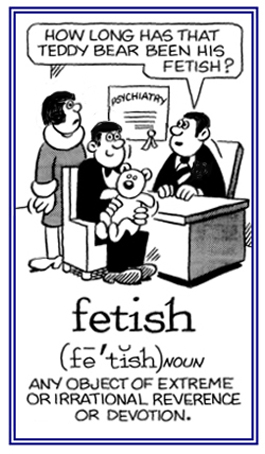fac-, facil-, fact-, feas-, -feat, -fect, -feit, -facient, -faction, -fic-, -fy, -ficate, -fication
(Latin: to make, to do, to build, to cause, to produce; forming, shaping)
1. Something that a person enjoys very much in a way that is unusual, nonsensical, or unreasonable: When Mary saw her daughter’s collection of pencils, she thought it was quite an uncommon fetish.
2. An irrational or abnormal fixation or preoccupation about doing something; an obsession: Joe had a fetish about his favorite football team and collected everything he could find about it, including banners, streamers, T-shirts, posters, photos, newspaper articles, etc. and hanging up many of them on the walls of his bedroom!

© ALL rights are reserved.
Go to this Word A Day Revisited Index
2. An irrational or abnormal fixation or preoccupation about doing something; an obsession: Joe had a fetish about his favorite football team and collected everything he could find about it, including banners, streamers, T-shirts, posters, photos, newspaper articles, etc. and hanging up many of them on the walls of his bedroom!

Go to this Word A Day Revisited Index
so you can see more of Mickey Bach's cartoons.
fetishism
fetishist
fiction
1. Novels and stories that describe imaginary people and events.
2. A novel, story, or other work of fiction.
3. Something that is untrue and has been made up to deceive people: "The account of that incident was pure fiction."
4. The act of pretending or inventing something: "They were living the fiction that their marriage had become.
5. Something that is assumed in law to be true regardless of whether or not it is true.
6. Etymology: from about 1398, "something invented", from Latin fictionem (nominative case, fictio), "a fashioning" or "feigning"; from fingere, "to shape, to form, to devise, to feign", originally "to knead, to form out of clay".
2. A novel, story, or other work of fiction.
3. Something that is untrue and has been made up to deceive people: "The account of that incident was pure fiction."
4. The act of pretending or inventing something: "They were living the fiction that their marriage had become.
5. Something that is assumed in law to be true regardless of whether or not it is true.
6. Etymology: from about 1398, "something invented", from Latin fictionem (nominative case, fictio), "a fashioning" or "feigning"; from fingere, "to shape, to form, to devise, to feign", originally "to knead, to form out of clay".
fictitious (adjective), more fictitious, most fictitious
1. Relating to not being true or genuine, and intended to deceive or used for tricking people.
2. Pertaining to being invented by someone's imagination; especially, as part of a work of fiction.
3. Referring to not being genuinely believed or felt; a sham: Margaret greeted her brother with fictitious enthusiasm.
4. Etymology: as a type of literature, about 1599: fictitious is from about 1615; from Middle Latin fictitus, a misspelling of Latin ficticius, "artificial, counterfeit"; from fictus, past participle of fingere.
2. Pertaining to being invented by someone's imagination; especially, as part of a work of fiction.
3. Referring to not being genuinely believed or felt; a sham: Margaret greeted her brother with fictitious enthusiasm.
4. Etymology: as a type of literature, about 1599: fictitious is from about 1615; from Middle Latin fictitus, a misspelling of Latin ficticius, "artificial, counterfeit"; from fictus, past participle of fingere.
figure
1. A written or printed symbol representing something other than a letter of the alphabet; especially, a number.
2. An amount represented in numbers.
3. A person, especially a well-known one; such as, a person's public image or presence.
4. The shape of an individual human body; especially, with regard to its slimness or attractiveness.
2. An amount represented in numbers.
3. A person, especially a well-known one; such as, a person's public image or presence.
4. The shape of an individual human body; especially, with regard to its slimness or attractiveness.
forfeit
forfeitable (adjective), more forfeitable, most forfeitable
Capable of something being given up or lost because of an offence or error: All items not permitted into the country can be forfeitable or confiscatable by customs.
forfeiter
forfeiture
fortification
fortified, more fortified, most fortified (adjectives)
1. That which has been strengthened or protected: "A fortified place is something like a military fort, where people can be protected from danger."
"The warrior who wore a fortified suit of armor had a better chance of surviving during battles."
2. Consuming or doing something that strengthens a person's health: "Those who eat properly and exercise regularly, usually live a more fortified life than those who don't."
1. Anyone who strengthens a someplace with defensive works in order to protect it against attack: "The administer of the city near the coast was given credit for having been a great fortifier of the area for the safety of its citizens."
2. Those who strengthen or invigorate others mentally or physically: "The physical educators were known as fortifiers who improved the health and intellectual well-being of their students."
2. Those who strengthen or invigorate others mentally or physically: "The physical educators were known as fortifiers who improved the health and intellectual well-being of their students."
fortifying
frigorific
Producing, or generating, extreme cold.


